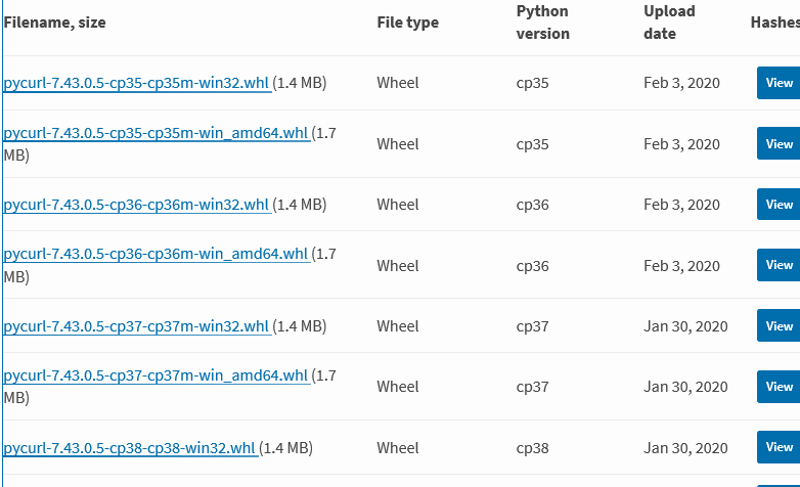
一:模块介绍
Pycurl是一个用C语言编写的libcurl Python实现,功能非常强大,支持操作协议有FTP,HTTP,HTTPS,TELNET等。与urllib相比,Pycurl的速度要快很多。
二:安装
大家可以去官网下载与本地Python一直的whl或exe包。

也可以使用下面的命令行直接安装。
pip install pycurl

三:主要方法
pycurl.Curl() #创建一个pycurl对象的方法
pycurl.Curl().setopt(pycurl.URL, http://www.pythontab.com) #设置要访问的URL
pycurl.Curl().setopt(pycurl.MAXREDIRS, 5) #设置最大重定向次数
pycurl.Curl().setopt(pycurl.CONNECTTIMEOUT, 60)
pycurl.Curl().setopt(pycurl.TIMEOUT, 300) #连接超时设置
pycurl.Curl().setopt(pycurl.USERAGENT, "Mozilla/5.0 (compatible; MSIE 6.0; Windows NT 5.1; SV1; .NET CLR 1.1.4322)") #模拟浏览器
pycurl.Curl().perform() #服务器端返回的信息
pycurl.Curl().getinfo(pycurl.HTTP_CODE) #查看HTTP的状态 类似urllib中status属性
pycurl.HTTP_CODE HTTP 响应代码
pycurl.REDIRECT_COUNT 重定向的次数
pycurl.SIZE_DOWNLOAD 下载的数据大小
pycurl.CONTENT_LENGTH_DOWNLOAD 下载内容长度
pycurl.RESPONSE_CODE 响应代码
pycurl.SPEED_DOWNLOAD 下载速度
四:示例DEMO
下面的示例代码是我2015年开发通用爬虫时,使用的一部分,现在已经改成并发模式了(后面会有简单的介绍),不过大家还是可以做个参考。
# encoding=utf-8
import pycurl , traceback
from com.fy.utils.html.HtmlCode import HtmlCodeUtils
from io import BytesIO # <-- 这个用到里面的write函数
class Utils_PyCurl:
def __init__(self,):
self.hcu = HtmlCodeUtils() #根据HTML源码获取网页编码
self.c = pycurl.Curl()
self.c.setopt(pycurl.CONNECTTIMEOUT, 60)#链接超时
self.c.setopt(pycurl.TIMEOUT, 60) #下载超时
self.c.setopt(pycurl.MAXREDIRS, 5)#设置重定向次数
self.c.setopt(pycurl.USERAGENT, 'Mozilla/4.0 (compatible; MSIE 6.0; Windows NT 5.1; SV1; .NET CLR 1.1.4322)')#模拟浏览器
def PyCurl_Html(self, url):
self.requestCode = 0#URL请求返回码
host = url
for i in range(2):
del i
html, code = self.fetch_html_pycurl(host)
if int(self.requestCode) == 200:
return html, code
elif html == None:
continue
return None, None
def fetch_html_pycurl(self, host):
result = None
try:
self.c.setopt(self.c.URL, host)
self.c.setopt(self.c.HTTPHEADER, ['Accept:'])
e = BytesIO()
self.c.setopt(self.c.WRITEFUNCTION, e.write)
self.c.setopt(self.c.FOLLOWLOCATION, 1)
self.c.perform()
data = e.getvalue();
html_code = self.hcu.getChardet(data)#获取网页编码
result = str(data.decode(html_code, 'ignore'))
self.requestCode = self.c.getinfo(self.c.HTTP_CODE)
if result != None:print(len(result), self.requestCode)
else:print(self.requestCode)
except :print(traceback.print_exc())
return result, self.requestCode
pyc = Utils_PyCurl()
html, code = pyc.PyCurl_Html("文章地址")
print("code:", code)
print(html)
五:并发
在大批量数据采集时,我们需要对上述的代码进行二次封装,实现并发处理,提高下载的速度。多线程是实现并发最基础的方式,这里就不再次介绍。今天我们介绍一下基Gevent协程的并发处理。
1:Gevent介绍
gevent是Python世界中最重要的异步网络库,可以大幅度提高系统的性能。最可贵的是,它允许我们几乎不修改代码,把同步程序变为异步程序。
2016年是Python3的重要时刻。Scrapy刚宣布支持Python3不久,Gevent又宣布支持Python3了。
给大家一个编码建议:如果用Python2,只用Python2.7;如果使用Python3,请至少使用Python3.4,最好使用Python3.5。
支持Python版本:
Python2.7及Python>=3.4
Gevent是基于协程的Python网络库。
包含的特性:
• 基于libev的快速事件循环(Linux上epoll,FreeBSD上kqueue)。
• 基于greenlet的轻量级执行单元。
•API的概念和Python标准库一致(如事件,队列)。
•可以配合socket,ssl模块使用。
•能够使用标准库和第三方模块创建标准的阻塞套接字(gevent.monkey)。
•默认通过线程池进行DNS查询,也可通过c-are(通过GEVENT_RESOLVER=ares环境变量开启)。
•TCP/UDP/HTTP服务器
•子进程支持(通过gevent.subprocess)
•线程池
** 2:安装**
pip install wheel
pip install gevent 或者 pip3 install gevent
具体安装命令视安装的Python 的版本而定。当出现 Successfully installed ...... 的提示后,即表示 gevent 安装成功。

如果中途出现异常,一定是依赖的包没有提前安装。具体的问题,根据提示处理,基本上就可以解决了。
3:基于的Gevent和pycurl 并发模式改造后的完整代码如下:
import pycurl , time, traceback
#如果没有给gevent打上补丁的话,它是检测不到除gevent它本省自带的IO操作的,当打上了补丁,它就能检测到程序其他所有的IO操作
from com.fy.utils.html.HtmlCode import HtmlCodeUtils
from io import BytesIO # <-- 这个用到里面的write函数
from gevent import monkey;
monkey.patch_all()#把当前程序的所有IO操作给我单独的做上标记
#如果没有给gevent打上补丁的话,它是检测不到除gevent它本省自带的IO操作的,当打上了补丁,它就能检测到程序其他所有的IO操作
import gevent
class Utils_PyCurl:
def __init__(self,):
self.hcu = HtmlCodeUtils() #根据HTML源码获取网页编码
self.c = pycurl.Curl()
self.c.setopt(pycurl.CONNECTTIMEOUT, 60)#链接超时
self.c.setopt(pycurl.TIMEOUT, 60) #下载超时
self.c.setopt(pycurl.MAXREDIRS, 5)#设置重定向次数
self.c.setopt(pycurl.USERAGENT, 'Mozilla/4.0 (compatible; MSIE 6.0; Windows NT 5.1; SV1; .NET CLR 1.1.4322)')#模拟浏览器
def geventControl(self, tasks, urlFieldName):
print("待处理的任务【" + str(len(tasks)) + "】个...")
start_time = time.time()
self.urlFieldName = urlFieldName#集合中存放地址的key
jobs = [gevent.spawn(self.fetch_html_pycurl, task) for task in tasks]
htmls = gevent.joinall(jobs, timeout=60, raise_error=False)
end_time = time.time()
print("下载页面【完毕】,共历时:【" + str((end_time - start_time))[0:4] + "】s.....\n")
del htmls
return tasks, (end_time - start_time)
def fetch_html_pycurl(self, task):
host = task[self.urlFieldName]#待处理的地址
html = None#HTML源码
requestCode = 200#返回的状态码
try:
self.c.setopt(self.c.URL, host)
self.c.setopt(self.c.HTTPHEADER, ['Accept:'])
e = BytesIO()
self.c.setopt(self.c.WRITEFUNCTION, e.write)
self.c.setopt(self.c.FOLLOWLOCATION, 1)
self.c.perform()
data = e.getvalue();
html_code = self.hcu.getChardet(data)#获取网页编码
html = str(data.decode(html_code, 'ignore'))
requestCode = self.c.getinfo(self.c.HTTP_CODE)
if html != None:print("HTML-length:", len(html), "HTTP_CODE:", requestCode, "request-url:", host)
else:print("HTML-length:", 0, "HTTP_CODE:", requestCode, "request-url:", host)
except :
requestCode = 400
print(traceback.print_exc())
task['HTML'] = html#HTML源码
task['HTTP_CODE'] = requestCode#返回的状态码
return task
pyc = Utils_PyCurl()
start_time = time.time()
for pageNo in range(1, 11):
tasks = []
for i in range(1, 100):
task = {}
task['url'] = "文章地址"
tasks.append(task)
pyc.geventControl(tasks, "url")
end_time = time.time()
print((end_time - start_time))
通过上述改造完以后,对其做了个简单的测试。
样本URL:1000个,分十批,每批次100个URL。共历时49秒。
用的是我的一个用了三年的笔记本,性能较差,如果是放在服务器的Linux环境下的话,30秒内下载完毕,绝对不在话下。
在分布式大批量采集中,使用多进程+协程并发的模式,单台服务器,一分钟下载1W个网页,绝对没有问题。
今天就说这么多了,改天介绍一下采集的整体架构。







